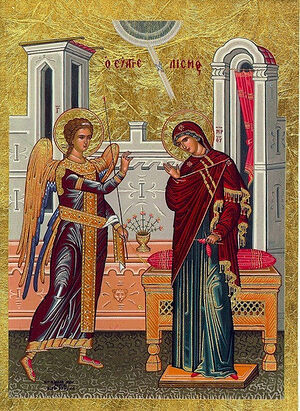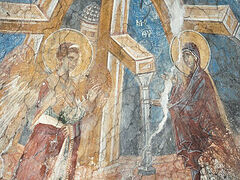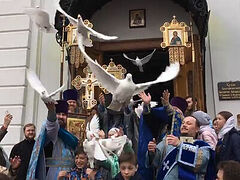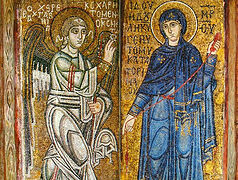 Nowhere is the Most Holy Virgin Mary so blessed as in the Divine services for the feast of the Annunciation. Here she is glorified as the author of our salvation. “Today is the beginning of our salvation,” says the troparion of this feast. But the same troparion also shows us the reason why the Virgin Mary is so honored by the Church: “The Son of God becomes the Son of the Virgin as Gabriel announces the coming of grace.” Therefore, the Virgin Mary is glorified as the initiator of our salvation, in that she was vouchsafed to be the Mother of the Son of God and gave us the opportunity to receive the grace of the Holy Spirit to make us sons of God by grace and to inherit Divine glory here, and especially in the future age.
Nowhere is the Most Holy Virgin Mary so blessed as in the Divine services for the feast of the Annunciation. Here she is glorified as the author of our salvation. “Today is the beginning of our salvation,” says the troparion of this feast. But the same troparion also shows us the reason why the Virgin Mary is so honored by the Church: “The Son of God becomes the Son of the Virgin as Gabriel announces the coming of grace.” Therefore, the Virgin Mary is glorified as the initiator of our salvation, in that she was vouchsafed to be the Mother of the Son of God and gave us the opportunity to receive the grace of the Holy Spirit to make us sons of God by grace and to inherit Divine glory here, and especially in the future age.
From this it becomes clear why we, together with the Church, turn to none of the saints and angels, but to her alone, as well as to Christ the Savior with the prayerful words: “Save us,” for as Bishop Theophan the Recluse teaches, she alone had a special, inner participation in the work of our salvation. For this salvation, God had to be incarnated on earth. Whence did the Lord take a body for Himself? From the womb of the Most Holy Virgin Mary.
Then the Lord tells us: Except ye eat the flesh of the Son of Man, and drink His blood, ye have no life in you (Jn. 6:53). So, without communion of the Holy Mysteries of Christ, there’s no salvation for us. Where did this Body and Blood come from in the Divine Eucharist? Again, from the blessed virginal womb of the Most Pure Virgin Mary. How wondrously the Mother of God participated in the salvation of mankind, giving a body to God for His incarnation!
Thus she continues to save and will save us until the end of the world through the Mystery of the Divine Eucharist. This is why the Mother of God has such prayerful boldness before her Son, the Lord Jesus Christ. Even if the entire Church, both earthly and Heavenly, with all the angelic hosts, with all the saints, beseech God for us, we won’t receive such power of prayerful petitions as belongs to her alone, our intercessor, the Most Holy Virgin Mary. Therefore, in all our sorrows and misfortunes, let us prayerfully resort to the Mother of God with the immutable hope that our every prayer addressed to her will be heard by her.
Is it hard for you to leave off the great sin that enthralls you? Pray to the Mother of God and she will help you throw off the heavy chains of sin that reign over you. Have you lost your home and been left without means to live? Pray to her and she’ll help you. Are you despondent, in mortal anguish? As often as possible, say the prayer: “Rejoice, Virgin Theotokos,” or “We have no other help but thee,” or simply cry out: “Forgive me, O Mother of God, and gladden me.” And she, the comforter and Joy of All Who Sorrow, will wipe away your tears with her hand and will delight you with her speedy and wondrous joy.
But people could say: “How fervently we have prayed to the Mother of God, but she didn’t fulfill our prayer.” We can answer this with the words of St. John Chrysostom:
When the Lord doesn’t fulfill our prayers, it’s a sure sign that what we entreat isn’t to our benefit and that He, the merciful one, wants to give us in response to our prayer an incomparably greater good than that which we entreated of Him.
Therefore, beloved, let us always remember that not a single prayer to the Mother of God is fruitless, for her love for us is too great, and her intercession for us before the throne of God is all-powerful.
Finally, it’s salvific for us to remember that the Mother of God acquired such intercession from God not only because of her inner participation in the work of our salvation, but also because of her wondrous humility. This humility is testified to by the following words of one of the Annunciation stichera: “Do not deceive me with trickery, for I have not known pleasure; I have not entered into wedlock. How then shall I bear a Child?” These words are a paraphrase of those of the Virgin Marcy from the Gospel: How shall this be, seeing I know not a man? (Lk. 1:34), which she spoke to the Archangel Gabriel in response to his announcement.
These words are very edifying for us, because they testify that the Virgin Mary received such great glory from God not without her own merits. They first of all point us to the complete contrast between the first mother of all living—Eve, and the second mother of all the spiritually living—the Most Holy Virgin Mary. The first was deceived by the devil’s lies: Ye shall be as gods (Gen. 3:5), and the second feared to be deceived even by the words of Divine truth; that is, by the annunciation of the extraordinary glory coming to her, to be the Mother of God Who was to be incarnate from her (Lk. 1:31-34).
Therefore, from the first Eve began the destruction of mankind due to her vainglory, but from the second Eve—the Virgin Mary—began the foundation of the salvation of mankind thanks to her humility. What salvific lesson is the holy Church teaching us here? That we must imitate the Most Pure Virgin Mary in her humility. Through this humility, the Most Holy Virgin became the Mother of God and received great Divine glory, as she herself testifies in her hymn before the Righteous Elizabeth with the words: For He hath regarded the low estate of his handmaiden: for, behold, from henceforth all generations shall call me blessed (Lk. 1:48).
The saints always imitated this humility of the Mother of God in their spiritual lives and in their grace-filled glory; and the more grace shone in them, the more they were humbled. Thus, the Apostle Paul called himself a servant of his spiritual children (2 Cor. 4:5). St. Seraphim of Sarov, who was vouchsafed twelve wondrous appearances of the Most Pure Mother of God and was exalted like the Apostle Paul to the third heaven, called himself nothing other than the poor and sinful Seraphim, prostrated before the laity, and even kissed their hands.
And let us, beloved, imitate the humility of the Mother of God together with the saints of God. Therefore, when people praise us, let us recall the words of the Prophet Isaiah: They that pronounce you blesses lead you astray, and pervert the path of your feet (Is. 3:12). Let us not be like a barren tree whose empty branches always strive upward and which, in the words of Christ, is cut down and thrown into the fire. But let us be like a tree whose branches are bent towards the ground from the multitude of fruits on them.
May the Most Pure Mother of God herself teach us such humility and strengthen us, that we might not fall into deadly prelest through conceit and vanity, that we might ever be in the Orthodox faith and the grace of the Holy Spirit. Then we will become true children of God, ever in unity with Christ, to taste the joy of this unity even here on earth and especially in the future age, in the Heavenly Kingdom of Christ—for the sake of the prayers of our intercessor, the Most Pure Virgin Mary. Amen.
Delivered in the Russian Church of St. Nicholas in Sofia, March 25, 1931



